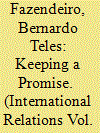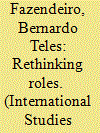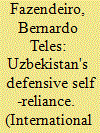|
|
|
Sort Order |
|
|
|
Items / Page
|
|
|
|
|
|
|
| Srl | Item |
| 1 |
ID:
178496


|
|
|
|
|
| Summary/Abstract |
States, governments and leaders often reject one another’s role prescriptions. They stick to enacting their role, what they consider to be their central purpose and main promise within a given international society. By applying the main tenets of role theory, this essay looks at the reasons why actors sometimes reject the prescriptions of others, including attempts at bargaining. Rather than claiming that those prescriptions are rejected on account of the pursuit of self-identity or ontological security, this essay suggests that those positions have more to do with defending the public credibility of one’s master role, the core promise made by an actor to (domestic and/or international) audiences. Master roles have to do with the main promises of an actor in a given social and political order, thereby providing credibility to a domestic and international audience. Without maintaining credibility, the actor is unlikely to be able to fulfil master and auxiliary roles as initially set out. The essay contributes to role theory in three ways: by looking beyond explanations centred on identification and ontological security, by conversely building upon public credibility, and also by showing how audiences and roles matter to illiberal regimes. To illustrate the argument, the essay addresses the government of Uzbekistan’s attempt to keep credibility in the face of Russian altercasting in the 1990s.
|
|
|
|
|
|
|
|
|
|
|
|
|
|
|
|
| 2 |
ID:
148677


|
|
|
|
|
| Summary/Abstract |
This article argues for a practice of reflexive role ascription in International Relations (IR) to prevent actor normalization. Roles are useful and often applied in narratives to facilitate our understanding of particular actors or subject positions. Yet, recurrent and non-reflexive ascriptions give rise to normalization, shaping how actors become understood. Awareness of performativity, over-generalization, and over-determining roles would thus contribute to more nuanced understandings of actors and prevent limited yet insightful role ascriptions from becoming the norm. The article builds on two largely compatible turns in IR—the reflexive and narrative turns—with a view to enlarging the concept of role beyond the domain of interaction and drama. It thus reviews the manner in which roles have been conceptualized in IR and extends their definition. Then, by focusing on the notions of attribution, predication, and Judith Butler's performativity, the article propounds a two-level approach to reflexive role ascription–derived from Paul Ricoeur’s hermeneutics—that deters narratives and their roles from normalizing subject positions in IR.
|
|
|
|
|
|
|
|
|
|
|
|
|
|
|
|
| 3 |
ID:
142622


|
|
|
|
|
| Summary/Abstract |
The article looks at Uzbekistan's political economy from the perspective of a logic of appropriateness, an approach that takes rules to be the underlying principle of action. The rules are mostly in line with a ‘spirit’ of self-reliance (mustaqillik), which has shaped Tashkent's international engagement since independence. From the perspective of those rules, the article reveals some important features of Russian–Uzbek relations, particularly the difficult and often tense negotiations over the future of the Tashkent Aviation Production Association (TAPOich). Self-reliance and the rules by which it was comprised were not, in the end, conducive to long-term cooperation with Russia in the aviation sector, where collaboration was first and foremost necessary.
|
|
|
|
|
|
|
|
|
|
|
|
|
|
|
|
| 4 |
ID:
153849


|
|
|
|
|
| Summary/Abstract |
President Islam Karimov's death provides an opportunity to gauge the origins and consequences of Uzbekistan's foreign policy. This article is aimed at contributing to that on-going conversation. To do so, it assesses the nature of Uzbekistani foreign policy, which the author categorizes as a type of defensive self-reliance, and to what extent the latter conditioned the government of Uzbekistan's international engagement. The author describes the main features of self-reliance and argues that the pursuit thereof led to five key trends: the relentless concern with international equality; a focus on bilateral relations; an aggressive defence of Uzbekistan's image; a drive for self-sufficiency; and a reluctance to embrace expansionist ideological agendas. To make his argument, the author begins by conceptualizing and distinguishing between ‘defensive’ and ‘offensive’ manifestations of self-reliance. He then traces the patterns of Uzbekistani self-reliance and concludes with a brief assessment of potential consequences were the foreign policy to change in the near future. The conclusion suggests that a shift from defensive to offensive self-reliance may constitute a problematic change to Uzbekistani foreign policy, but that relaxing any other of those trends may help open up the republic and the region of post-Soviet central Asia as a whole.
|
|
|
|
|
|
|
|
|
|
|
|
|
|
|
|
|
|
|
|
|